August 2023
- 中文
- 日本語
Why Arbitrate in Japan?
-
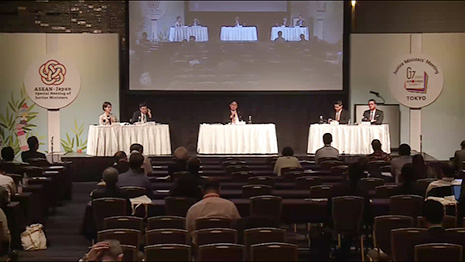
The "Justice Affairs Diplomacy" Ministerial Forum hosted a special event titled "Future Prospects of International Arbitration and Mediation: How Does the Judiciary Assist?" -
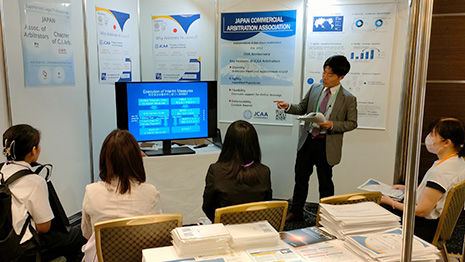
An exhibit communicating Japan's appeal as a venue for international arbitration

You might have heard of the word "international arbitration". International arbitration is a procedure for resolving disputes arising from international business transactions in which the parties to the dispute select a third-party arbitrator to reach a settlement, in lieu of pursuing litigation in a country's domestic court system. As the following sections describe in more detail, international arbitration offers a variety of advantages. Accordingly, it has become a global standard for resolving international business disputes. Japan is a signatory to the major international conventions on arbitration, including the New York Convention. However, the number of arbitration cases in Japan is considerably lower than in other Asian countries.
Advantages of international arbitration
Two main approaches to resolving legal disputes occurring in international business transactions are available: litigation and arbitration. Trial-based litigation involves use of a specific country's courts and carries a number of risks for the parties to the dispute. For example, parties are generally unable to select the procedures and language used at trial, judges may be unfamiliar with commercial practices in the field, and hearings, which are customarily open to the public, may threaten the confidentiality of trade secrets.
International arbitration has an extensive history of use around the world as a method of dispute resolution well-suited to international business. It offers more expeditious timelines and greater degrees of freedom, helping to avoid the disadvantages of litigation.
International arbitration offers a range of advantages to trial-based litigation. These include the facilitation of enforcement in foreign countries, the ability to preserve the confidentiality of trade secrets thanks to closed-door proceedings, the option for parties to select neutral arbitrators with specialized expertise, and more expeditious timelines for settlement of disputes due to the general absence of the appellate process.
Efforts to promote international arbitration in Japan
In April 2018, the Japanese government outlined measures to strengthen international arbitration in Japan in order to promote development of the country as the foremost base for dispute resolution in Asia. This led the Ministry of Justice (MOJ) to commission the Japan International Dispute Resolution Center (JIDRC) to initiate a survey project aimed at developing infrastructure for international arbitration in Japan. Working in cooperation with nongovernmental organizations engaged in arbitration promotion activities, including the Japan Commercial Arbitration Association (JCAA) and the Japan Association of Arbitrators (JAA), the Ministry has worked to advance human resources development, familiarization with the international arbitration system, and so on through public-private partnerships. Meanwhile, it has promoted legislative reforms as well, including a partial amendment of the Arbitration Act which passed in April 2023, to bring Japan's laws on arbitration procedures in line with the latest international standards. Today, work still remains to promote higher degrees of familiarity. Accordingly, the MOJ is currently engaged in activities to raise awareness, including approaches such as conducting training, seminars, and social media-based PR activities, to encourage better understanding of the usefulness of international arbitration among Japanese companies, along with Japan's appeal as a venue for arbitration among companies based outside Japan.。
For example, at the "Justice Affairs Diplomacy" Ministerial Forum* held in July 2023, which included the G7 Justice Ministers' Meeting, the MOJ held a commemorative special event with speeches and panel discussions by judges, arbitrators, and researchers on the theme "Future Prospects of International Arbitration and Mediation: How Does the Judiciary Assist?" The Ministry also presented exhibits to convey Japan's appeal as a venue for international arbitration and worked to showcase the JCAA's arbitration track record, efforts to develop relevant infrastructure engaging the public and private sectors, and more.

New options for resolving international business disputes
How can businesses make use international arbitration? First of all, international arbitration requires an agreement between the parties to the dispute (an arbitration agreement) that must be prescribed as an arbitration clause in a contract between them. Arbitration clauses allow for specification of the arbitral institution to preside over arbitration, the venue or seat of arbitration, and other details. Many arbitral institutions are found around the world. The JCAA is a prime example of one such commercial arbitral institution based in Japan. The association, which has continuously handled international business disputes for over 70 years, allows the appointment of prominent arbitrators of diverse nationalities, even when selecting JCAA arbitration. The JCAA facilitates expeditious and flexible proceedings encompassing online options and reliably provides detailed support through its secretariat.
The International Court of Arbitration (ICC), a world-renowned arbitral institution based in Paris, also has an extensive record of international arbitration administered with Japan as the seat of arbitration. For more details on the actual process of arbitration, please refer to the arbitral institutions' websites. (See "2. Concerning the flow of arbitration proceedings, etc." below.)
Readers who have had their interest sparked by this article are encouraged to visit these external websites and consider international arbitration in Japan as an option for resolving international business disputes.
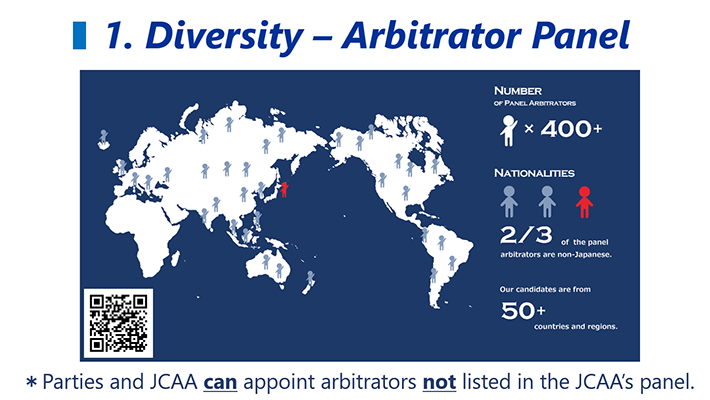
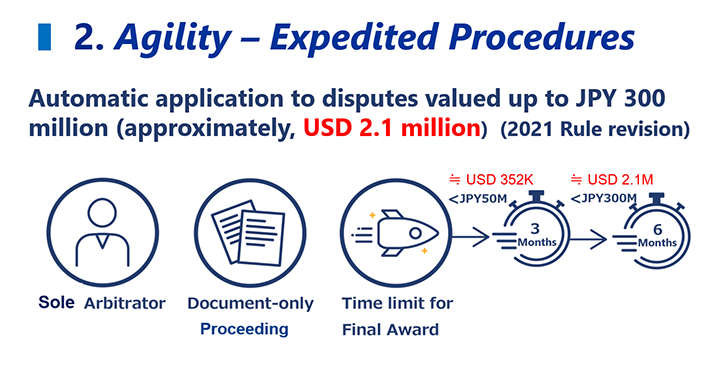
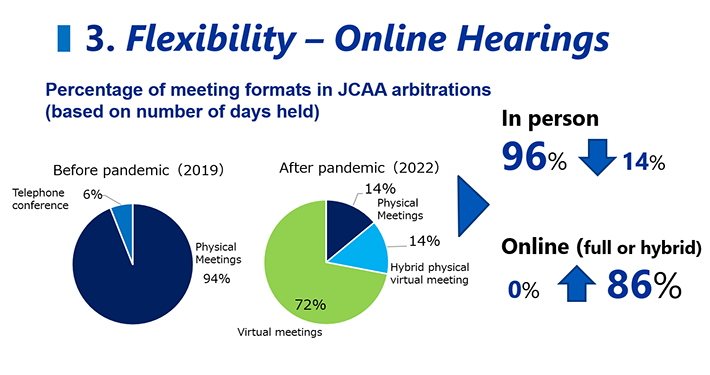
URLs of government agencies and relevant institutions for reference
1. Concerning government-implemented measures
○https://www.moj.go.jp/EN/kokusai/kokusai03_00003.html
○https://www.meti.go.jp/english/policy/trade_and_invest/inter_arb/index.html
2. Concerning the flow of arbitration proceedings, etc.
Arbitral institutions' websites offer more information on the flow of arbitration proceedings.
○https://www.jcaa.or.jp/en/arbitration/flow.html
○https://iccwbo.org/
3. Arbitration promotion activities and introduction of arbitration facilities
The JAA conducts activities to foster human resources related to arbitration and mediation, etc. Also, the JIDRC works to introduce arbitration hearing facilities.
○https://en.arbitrators.jp//
○https://idrc.jp/en/
* See "Japan to Host the 'Justice Affairs Diplomacy' Ministerial Forum" in the June 2023 issue of Highlighting Japan

